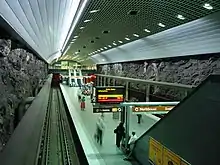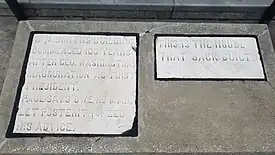Peachtree Center station
Peachtree Center is an underground train station on the Red and Gold lines of the Metropolitan Atlanta Rapid Transit Authority (MARTA) rail system. It is the deepest station in the MARTA rail system, at 120 feet (37 m) below Peachtree Street.[3] It serves the Peachtree Center neighborhood of downtown Atlanta, and is the first station north-northeast of the rail system hub at Five Points. Peachtree Center is one of the busiest stations on the Red/Gold Lines, handling over 15,000 people per weekday.
N1
Peachtree Center
| |||||||||||||||
|---|---|---|---|---|---|---|---|---|---|---|---|---|---|---|---|
| MARTA rapid transit station | |||||||||||||||
 | |||||||||||||||
| General information | |||||||||||||||
| Location | 216 Peachtree Street NE Atlanta, Georgia 30303 | ||||||||||||||
| Coordinates | 33.759677°N 84.387548°W | ||||||||||||||
| Platforms | 1 island platform | ||||||||||||||
| Tracks | 2 | ||||||||||||||
| Connections | |||||||||||||||
| Construction | |||||||||||||||
| Structure type | Underground | ||||||||||||||
| Parking | None | ||||||||||||||
| Bicycle facilities | 5 bike racks | ||||||||||||||
| Accessible | Yes | ||||||||||||||
| Architect | Toombs, Amisano and Wells[1] | ||||||||||||||
| Other information | |||||||||||||||
| Station code | N1 | ||||||||||||||
| History | |||||||||||||||
| Opened | December 11, 1982 | ||||||||||||||
| Passengers | |||||||||||||||
| 2013 | 7,453 (avg. weekday)[2] | ||||||||||||||
| Services | |||||||||||||||
| |||||||||||||||
Station layout

| G | Street Level | Entrance/Exit |
| M | Mezzanine | Fare barriers |
| P Platform level |
Southbound | ← Red Line, Gold Line toward Airport (Five Points) |
| Island platform, doors will open on the left | ||
| Northbound | Gold Line toward Doraville (Civic Center) → Red Line toward North Springs (Civic Center) → | |
Interior Design

The station has an island platform serving two tracks. The floor is made of gray tile, the "walls" are made of solid gneiss rock, and the ceiling panels are made of steel. Four escalator banks are used to access the station, with the Carnegie Way/Ellis Street (southwest) entrance having the longest escalators in the system, which MARTA claims are also the longest in the Southeast U.S.[4] The freestanding escalator at the CNN Center is longer at 205 feet (62 m).[5] The Ellis Street entrance was closed for more than two years for renovation; it re-opened on August 24, 2012. The Harris Street (northwest) entrance has a map of the MARTA system with proposed lines on it.

In Popular Culture
The station was featured in the 1985 movie The Heavenly Kid.[6]
Nearby landmarks and popular destinations
- Peachtree Center/Peachtree Center Business District
- Mall at Peachtree Center
- Truist Plaza
- AmericasMart
- Central Library
- Atlanta Streetcar
- Hard Rock Cafe
- American Cancer Society Center (formerly Inforum)
- Georgia Aquarium
- World of Coca-Cola
- Centennial Olympic Park
- Center for Civil and Human Rights
- Mercedes Benz Stadium
- State Farm Arena
- CNN Center
- Georgia World Congress Center
- College Football Hall of Fame
- Woodruff Park
- Westin Peachtree Plaza Hotel
- Atlanta Marriott Marquis Hotel
- SAE Institute
- Children's Museum of Atlanta[7]
- Rialto Center for the Arts
- Various downtown Atlanta hotels
Bus routes
The station is served by the following MARTA bus routes:
- Route 40 - Downtown / Peachtree Street
Connection to other transit systems
Construction
Although the operation of the North Line began between the Garnett and North Avenue stations on December 4, 1981, the Peachtree Center station between them did not open until September 11, 1982. A poster dating to 1982 on the station platform describes how the station was built. The poster reads:
- MARTA's moving Atlanta, 120 feet below Peachtree Street.
- The Peachtree Center station was built by tunneling through solid gneiss, a granite like rock formed of layers of quartz and mica. This rock provides underground support for the station. Soft ground or mixed tunneling was used where there was insufficient rock structure for underground support. With this method, compressed air twice the normal atmospheric pressure was used to support the walls while permanent structures were being built. Like deep sea divers, workers on this section of the rapid rail transit system were required to undergo 30 minutes of compression/decompression when entering or coming out of the tunnel. This station is only one of a few tunnels in the world where the walls and the ceiling were carved from solid rock.
- Length of longest escalator serving the station entrance across from the Atlanta Public Library is 190 feet- the longest in the southeast. Cost of Station: approx. $45 million. Station depth: 120 feet. Station length: 900 feet.
An exploratory tunnel was initially driven at the crown of the tunnel to provide input into rock quality. The cavern was constructed using a heading and bench approach, first excavating the heading and following with the bench excavation. All excavation on the cavern was accomplished using drill and blast methods. Vibration monitoring stations were established in buildings along Peachtree Street to monitor the vibrations and compare to contract limits.

The location the station was built on was originally the home to "The House That Jack Built", an eccentric commercial building built by Jasper Newton "Jack" Smith in the late 1800s. As part of a lease agreement Smith made with later leaseholders of the property, two inscribed marble slabs were to be displayed prominently in any future building constructed on the site. When Peachtree Center station opened in 1982, these two marble slabs were relocated to a fenced-off area near the subway station entrance.[8]
References
- Toombs, Amisano Wells (1982). "Peachtree Center Station : MIT Libraries". Archived from the original on June 26, 2015. Retrieved June 25, 2015.
- "2014 Transportation Fact Book" (PDF). Atlanta Regional Commission. Retrieved January 9, 2016.
- "MARTA SCHEDULES & MAPS". Archived from the original on March 19, 2015. Retrieved February 3, 2017.
- MARTA facts Archived 2007-09-27 at the Wayback Machine
- Hood-Cree, Cameron. "10 Longest escalators in the US". usabynumbers.com. Retrieved July 27, 2023.
- "The Heavenly Kid Trivia". IMDb.
- "Planning Your Visit". Children's Museum of Atlanta. Retrieved June 27, 2016.
- Keen, Raymond (September 28, 2016). "Jasper "Jack" Smith - Atlanta's Quaintest Character". History Atlanta. Retrieved February 27, 2020.